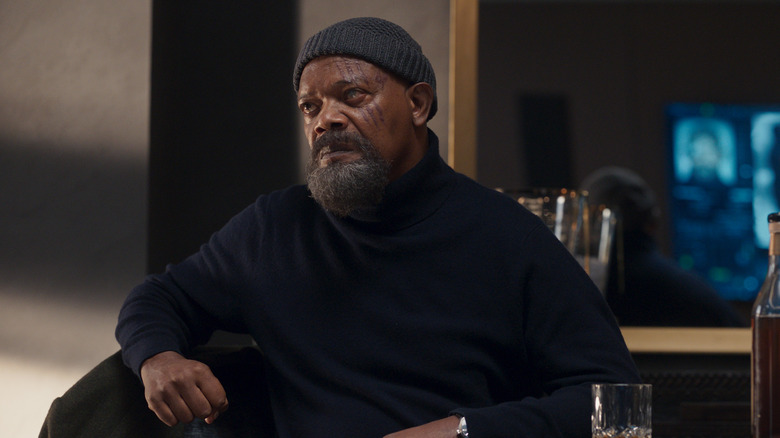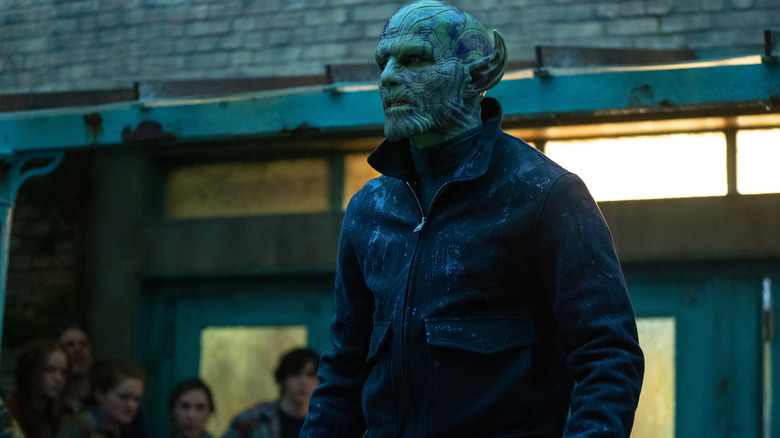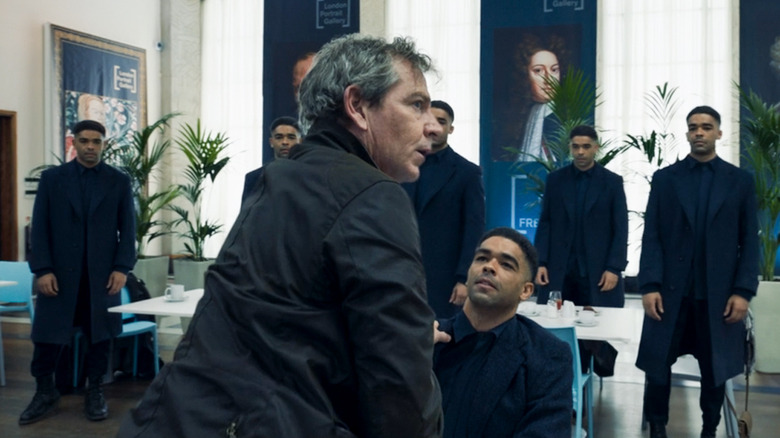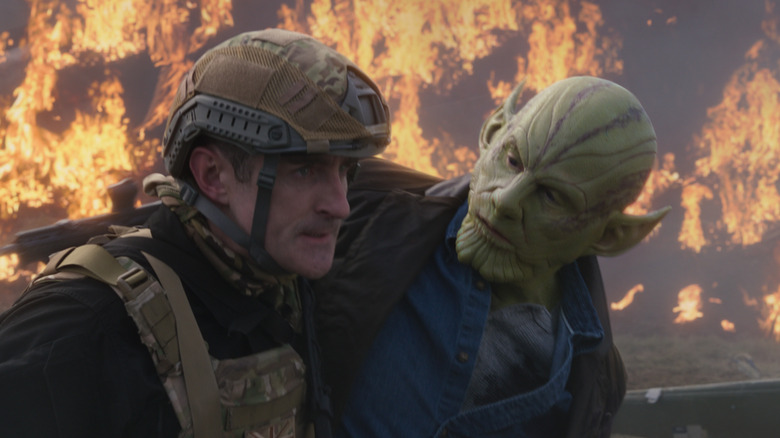The Secret Invasion Finale Is One Of The Worst-Reviewed Marvel Things Ever – What The Heck Happened?
Warning: This article contains spoilers and some pretty gruesome post-mortem details on what went wrong with "Secret Invasion."
The numbers are in, the hot takes have been pouring into social media, and the post-finale analysis of "Secret Invasion" can truly begin in earnest. As the smoke clears from this week's finale, which took the Marvel series that felt like most people weren't watching — and even less were actually enjoying — and finally put it out of its misery, the big picture is starting to come into focus. Needless to say, it's not exactly putting the Marvel Cinematic Universe in a flattering light, particularly on the heels of high-profile disappointments like "Thor: Love and Thunder" and "Ant-Man and the Wasp: Quantumania." For the first time in well over a decade, the previously invulnerable MCU is looking mighty mortal these days.
Now, Rotten Tomatoes percentages aren't the end-all, be-all yardstick by which all media must be measured. There's a world of nuance in between those "rotten" and "fresh" icons that can only be truly parsed by, you know, actually reading reviews and recaps. But there's also no denying the reality that Marvel had managed to become the dominant blockbuster force on the planet through the strength of consistent box office success and the shiny stamp of approval by critics worldwide. That reputation has taken more of a hit in recent years, bottoming out with the sixth episode of "Secret Invasion" and its shockingly paltry 11% rating on Rotten Tomatoes. For context, that's only slightly better than Josh Trank's "Fantastic Four," on par with 2005's "Elektra" and "Inhumans," and worse than the 1990 "Captain America." (The overall score for the season isn't much better, topping out at 60%.)
So what happened? And where does Marvel go from here? That's what we're here to find out.
What went wrong?
This should've been a slam dunk. If you look at the widespread disappointment over how "Secret Invasion" ultimately turned out, chances are you'll be able to pinpoint the common thread between all the negative reactions. When you factor in the potential of the comic book series of the same name authored by legendary Marvel writer Brian Michael Bendis, the crucial Skrull backstory established by 2019's "Captain Marvel," and the tangible hunger to see Samuel L. Jackson's Nick Fury finally step out of the shadows and into the spotlight that the actor so richly deserved, it feels undeniable: there's no way this should've been anything but another smash hit.
Instead, what we're left with is a series that managed to waste every ounce of potential that it ever had.
Once touted by eager fans as the second coming of "Captain America: The Winter Soldier" and even Marvel's answer to the grounded, grown-up action of "Andor" (seriously, people said this and now that narrative's being clowned on ruthlessly), "Secret Invasion" ended up a politic thriller that somehow forgot to include any actual political intrigue throughout its wheel-spinning story. Unable to refute the perception that a blockbuster event film had been downgraded to a toothless streaming series, the plot constantly strained to justify six hours worth of material while juggling a threat that should've amounted to truly global (or universal) stakes.
And as much as the series struggled to explore the inner life of Nick Fury before completely losing him in the shuffle (he doesn't even get a final showdown with the villainous Skrull Gravik, whose entire motivation was revenge against Fury!), the ultimate conclusion it draws with the Skrulls — refugees who only ever wanted a new home — basically condones xenophobia.
In short, "Secret Invasion" was a disaster.
How much Marvel is too much Marvel?
In many ways, the genie was out of the bottle the moment Marvel President Kevin Fiege and Disney at large decided to smash right through the natural conclusion of the MCU as we knew it — "Avengers: Endgame" — and forge ahead with the confused, aimless whims of Phase 4 and the even more unfocused Phase 5. Nobody's naïve enough to presume that Marvel should've abruptly sabotaged their own perennial cash cow just as it reached its record-breaking pinnacle ... but how about a little break, at least? With the 2020 pandemic shutdown, why couldn't Marvel take the downtime as a blessing in disguise and take a step back, weigh whether audiences had reached a saturation point with this never-ending franchise, and take a few years to reset and naturally drive up interest in the future of the franchise once again? Fellow Disney-owned Lucasfilm learned the hard way that crowding the market with "Star Wars" spin-offs and prequels stripped the brand of what made it special.
Nothing about crying wolf about the superhero bubble popping is new or original, but it's difficult to look at the steadily declining critical reception of various Marvel projects in the years since 2019 — with the lone exceptions of genuine filmmaker-driven projects, such as James Gunn's "Guardians of the Galaxy: Vol. 3," Ryan Coogler's emotionally-charged "Black Panther: Wakanda Forever," and even Michael Giacchino's TV special "Werewolf by Night" — and reach any other conclusion. But as the MCU has become increasingly insular, theoretically requiring fans to pay attention to extraneous material like "Loki," "Ms. Marvel," and "Secret Invasion" to make sense of movies like "The Marvels" and the upcoming "Armor Wars" and "Avengers: The Kang Dynasty," the #It'sAllConnected gimmick is having the opposite effect of driving viewers away.
(Shape)shifting strategies
Can Marvel pull themselves out of this tailspin? That's complicated. The movies should continue to perform as successfully as they have been, surprisingly enough. The extreme underperformance of "Ant-Man and the Wasp: Quantumania" is alarming, no doubt about it, but other divisive efforts such as "Doctor Strange in the Multiverse of Madness" and "Thor: Love and Thunder" still managed to bring in audiences by the popcorn bucketful. Based on the buzz generated by the trailers for "The Marvels," well, nobody should be surprised if that sequel breaks out, too. By and large, it's the influx of lackluster, inessential, and mostly forgettable Disney+ shows that have poisoned the well among general audiences, making it easier and easier for even Marvel diehards to acknowledge the flaws of various disappointing big-screen sequels.
For all the negative attention squarely fixed on the Marvel brand these days, we're not quite in DC Universe territory just yet, which required a complete overhaul to start over from scratch and salvage what remained. But does Feige & Co. really want to wait until things devolve to that level before figuring out how to course-correct? The answer certainly isn't to keep on the same track with more half-baked Disney+ slop like "Secret Invasion," created more out of an obligation to shareholders in the hopes of retaining streaming service subscribers rather than out of creative interest. We've already seen how fragile Marvel's plans can be, potentially undone and thrown into chaos by just one actor's (alleged) actions. With the AMPTP's refusal to negotiate in good faith, leading to the dual SAG-AFTRA and WGA strikes, further disruptions are on the horizon.
The clock is officially ticking on the MCU. The only question is how many more "Secret Invasion"-level flops it'll take for the studio to realize that, too.



